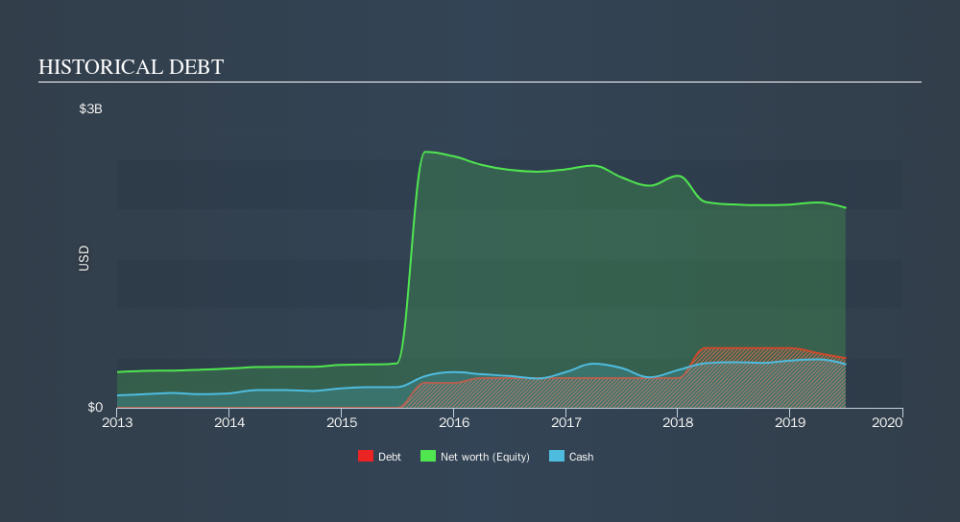These 4 Measures Indicate That NetScout Systems (NASDAQ:NTCT) Is Using Debt Reasonably Well

Some say volatility, rather than debt, is the best way to think about risk as an investor, but Warren Buffett famously said that 'Volatility is far from synonymous with risk. It's only natural to consider a company's balance sheet when you examine how risky it is, since debt is often involved when a business collapses. We note that NetScout Systems, Inc. (NASDAQ:NTCT) does have debt on its balance sheet. But the real question is whether this debt is making the company risky.
Why Does Debt Bring Risk?
Debt assists a business until the business has trouble paying it off, either with new capital or with free cash flow. Ultimately, if the company can't fulfill its legal obligations to repay debt, shareholders could walk away with nothing. However, a more usual (but still expensive) situation is where a company must dilute shareholders at a cheap share price simply to get debt under control. Having said that, the most common situation is where a company manages its debt reasonably well - and to its own advantage. When we think about a company's use of debt, we first look at cash and debt together.
See our latest analysis for NetScout Systems
How Much Debt Does NetScout Systems Carry?
The image below, which you can click on for greater detail, shows that NetScout Systems had debt of US$500.0m at the end of June 2019, a reduction from US$600.0m over a year. However, it also had US$438.1m in cash, and so its net debt is US$61.9m.
How Healthy Is NetScout Systems's Balance Sheet?
We can see from the most recent balance sheet that NetScout Systems had liabilities of US$349.6m falling due within a year, and liabilities of US$833.0m due beyond that. Offsetting this, it had US$438.1m in cash and US$160.0m in receivables that were due within 12 months. So its liabilities outweigh the sum of its cash and (near-term) receivables by US$584.5m.
This deficit isn't so bad because NetScout Systems is worth US$1.67b, and thus could probably raise enough capital to shore up its balance sheet, if the need arose. However, it is still worthwhile taking a close look at its ability to pay off debt.
In order to size up a company's debt relative to its earnings, we calculate its net debt divided by its earnings before interest, tax, depreciation, and amortization (EBITDA) and its earnings before interest and tax (EBIT) divided by its interest expense (its interest cover). This way, we consider both the absolute quantum of the debt, as well as the interest rates paid on it.
NetScout Systems has a very low debt to EBITDA ratio of 0.46 so it is strange to see weak interest coverage, with last year's EBIT being only 0.40 times the interest expense. So while we're not necessarily alarmed we think that its debt is far from trivial. We also note that NetScout Systems improved its EBIT from a last year's loss to a positive US$8.3m. When analysing debt levels, the balance sheet is the obvious place to start. But ultimately the future profitability of the business will decide if NetScout Systems can strengthen its balance sheet over time. So if you want to see what the professionals think, you might find this free report on analyst profit forecasts to be interesting.
Finally, while the tax-man may adore accounting profits, lenders only accept cold hard cash. So it is important to check how much of its earnings before interest and tax (EBIT) converts to actual free cash flow. Happily for any shareholders, NetScout Systems actually produced more free cash flow than EBIT over the last year. There's nothing better than incoming cash when it comes to staying in your lenders' good graces.
Our View
NetScout Systems's interest cover was a real negative on this analysis, although the other factors we considered were considerably better In particular, we are dazzled with its conversion of EBIT to free cash flow. When we consider all the elements mentioned above, it seems to us that NetScout Systems is managing its debt quite well. But a word of caution: we think debt levels are high enough to justify ongoing monitoring. Even though NetScout Systems lost money on the bottom line, its positive EBIT suggests the business itself has potential. So you might want to check outhow earnings have been trending over the last few years.
If you're interested in investing in businesses that can grow profits without the burden of debt, then check out this free list of growing businesses that have net cash on the balance sheet.
We aim to bring you long-term focused research analysis driven by fundamental data. Note that our analysis may not factor in the latest price-sensitive company announcements or qualitative material.
If you spot an error that warrants correction, please contact the editor at editorial-team@simplywallst.com. This article by Simply Wall St is general in nature. It does not constitute a recommendation to buy or sell any stock, and does not take account of your objectives, or your financial situation. Simply Wall St has no position in the stocks mentioned. Thank you for reading.

